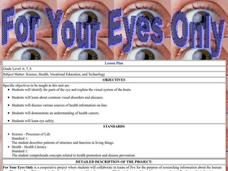University of Minnesota
Sheep Brain Dissection
Bored with frog and earthworm dissections? Had your fill of fetal pigs? Anatomy learners will be intrigued by the sheep's brain, and you will be prepared with guiding questions, extension activities, and pictures as they dissect one —...
Curated OER
Brain Health and Brain Anatomy
Students explore different intelligences. In this brain health lesson, students work through several activities to help them identify the type of intelligence they have. Students will focus on understanding their personal strengths and...
Scholastic
Prescription Pain Medication: What You Need to Know
The national epidemic of opioid addiction is making its way into high school populations. Educate the learners in your class about the ways prescription opioids can both block pain and deliver large amounts of dopamine that make it very...
Curated OER
Human Body Simon Says
Students display their new knowledge of human body parts' names and locations, by playing an adaptation of the game Simon Says. A more sophisticated version of the game can be played with older students as they learn more specific names...
Science Friday
Ugh, a Bug!
Young entomologists familiarize themselves with the physical characteristics of insects. Composed of two activities, each lesson involves your scientists tapping into their prior knowledge of bugs and making observations of real live...
Curated OER
Growing Eyeballs
Students investigate vision and the anatomy of the human eye. They complete a Webquest, watch a video about the structure of the eye, take an online quiz, answer discussion questions, and read newspaper articles about activities that...
Curated OER
For Your Eyes Only
Students complete several activities in a unit related to the eye. In this eye lesson, students work in groups to research information about the human eye and create a multimedia presentation. They research anatomy of the eye, how the...
Curated OER
Show 303: New Research into Dyslexia
Students explore the causes of dyslexia. They view CT sans and MRIs to view the brain and how it responds. Students read reports about dyslexia. They discuss the nature of dyslexia, its cause, how to diagnose it, and its permanency.









